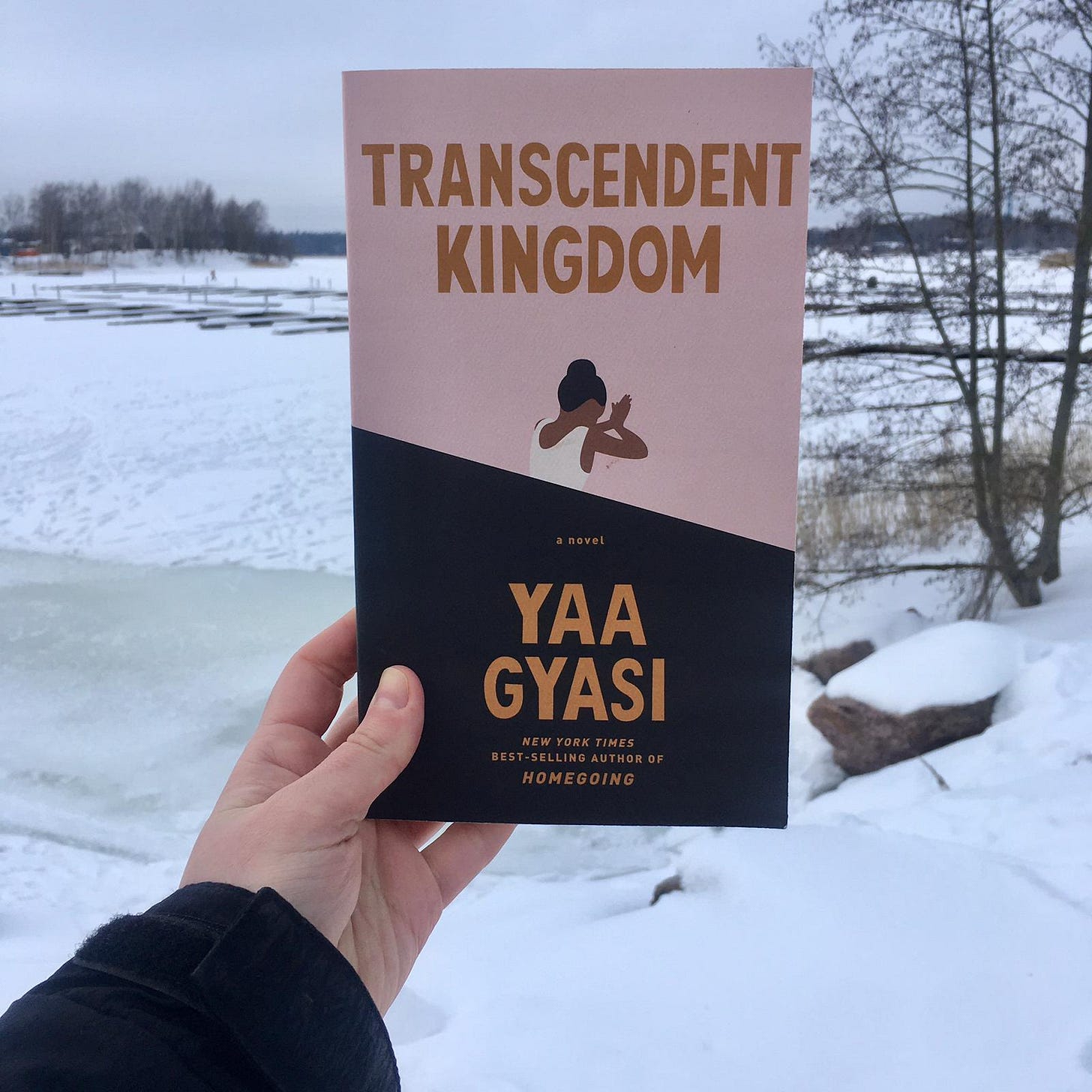Welcome to Bookmarked, a weekly newsletter following my journey as I read one book from every country. If you’re enjoying my project, I’d love it if you shared Bookmarked with a friend.
Yaa Gyasi’s Transcendent Kingdom is a raw and deeply intimate novel about Gifty, a neuroscience PhD student at Stanford who is dealing with the grief of a brother lost to addiction and a mother immobilised by depression.
When Gifty’s mother is randomly selected for permanent US residency, she moves from Ghana to Alabama with her son, Nana. They’re soon joined by Gifty’s father, though he doesn’t stay for long, returning to Ghana when Gifty is still a child, leaving his wife to find work and raise two children alone.
Gifty grows up in the shadow of Nana, a talented sports player who develops an opioid addiction following a minor basketball injury in high school.
Nana got hooked on the OxyContin; that much became clear to my mother about two months in when he asked to go back to the doctor for a second refill. She said no, and then she found more hidden in his light fixture. She thought the problem would just go away, because what do we know about addiction? What, other than the “just say no” campaigns, was there to guide us through the jungle of this?
Gifty’s mother tries everything she can to help, pleading with her son, sending him to a rehabilitation camp, and praying, but nothing works and eventually Nana dies of a heroin overdose. Gifty is 11-years-old and her mother, who has thus far exhibited almost superhuman strength—bathing her 16-year-old son without judgement when he becomes incapable of doing so himself—fades away as depression takes hold of her.
The story of Gifty and her mother is told in a beautifully woven narrative, switching between Gifty’s early memories of Nana’s death with her present day life as a neuroscientist researching reward-seeking behaviour in mice. Driven by her will to understand what happened to her brother and what is still happening to her mother, who is bedridden and staying with her, Gifty turns her back on the evangelical church within which she was raised and dedicates her career to searching for the answers within science.
Transcendent Kingdom is a truly heartbreaking book. Some of its scenes—like when Gifty’s parents hide food around their home because they can’t afford to keep up with their children’s growing appetites, and when Gifty and her mother struggle to lift a drug-addled six foot ten Nana into their car while passersby watch without helping—will stay with me for a long time. Gyasi’s writing is luminous and so many lines in this book pack an absolutely gut-wrenching punch.
Gyasi, who herself moved from Ghana to Alabama at the age of two, paints a masterful portrait of the complexities of dealing with addiction, whilst also exploring themes of religion, science, racism, poverty, and mental health. Gifty is one of the most fully-realised characters I’ve read: she’s mean, tender, hostile, and in desperate need of affection all at once. This is a book that really hit me hard.
Transcendent Kingdom by Yaa Gyasi (YNG Books, 2020)
More books by Ghanaian authors
Here’s a list of the other recommendations I got this week:
Changes: A Love Story by Ama Ata Aidoo
Harmattan Rain by Ayesha Harruna Attah
Definition of a Miracle by Farida N. Bedwei
The Housemaid by Amma Darko
Homegoing by Yaa Gyasi
His Only Wife by Peace Adzo Medie
Bineti by Selassie Mensah
Cloth Girl by Marilyn Heward Mills
A Time to Part by Ama Pomaa
What have you read recently?
If you’ve read a brilliant book in translation or want to pass on a recommendation, I’d love to hear about it! For this project, I’m focussing on contemporary fiction and short stories, with a preference for female authors—but I won’t be too dogmatic about it so do share recommendations that don’t quite fit the bill, too.
You can get in touch by replying to this email or leaving a comment. I’ll be featuring your recommendations in upcoming newsletters, and I’ll keep a growing list here.
Bookmarked is written by Tabatha Leggett. Thank you to Meli Eyram Portia Mansu from the Goethe-Institut Ghana for her recommendations for this week’s issue. If you know someone who would enjoy this newsletter, please forward it to them!




